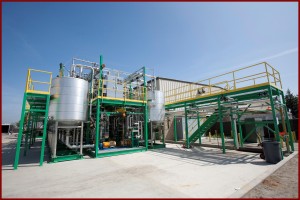
The pilot plant has the capacity to convert 2 dry tons per day of feedstock into cellulosic sugars and 50,000 gallons per year of ethanol.
Edeniq has launched a pilot bio-refinery in Visalia, California to demonstrate that existing corn ethanol plants can be converted to using Cellulosic feedstocks such as corn stover, switchgrass, sugarcane bagasse and woodchips. Edeniq is gathering data from the new plant for so called scale-up opportunities at commercial-sized facilities.
The new plant was constructed in partnership with Logos Technologies Inc. under a $25 million program funded 80% by the Integrated Biorefinery Initiative Program of the U.S. Department of Energy. Whether this is a good investment by taxpayers that might help recover some of the billions of dollars spent on subsidized corn ethanol or just more subsidies for agribusiness are open issues.
The pilot plant has the capacity to convert 2 dry tons per day of feedstock into cellulosic sugars and make 50,000 gallons per year of cellulosic ethanol. Edeniq also received a $3.9 million grant from the California Energy Commission.
According to the Department of Energy, ethanol produced from cellulosic materials has the potential to cut life cycle greenhouse gas emissions by up to 86% relative to gasoline.
“We are working towards this goal by demonstrating, in our pilot plant, advanced technologies and methods to convert non-food cellulosic feedstocks into ethanol in an economically and environmentally compelling way,” said Brian Thome, President and CEO of Edeniq.
The Edeniq systems can be added as bolt-on technologies to existing corn ethanol facilities or integrated into new cellulosic ethanol processing facilities, it’s claimed. Edeniq mills corn and other non-food plant materials into small, uniform pieces of feedstock that can be converted to sugars for conversion into cellulosic ethanol and other renewable products and materials. It also has enzymes to help break down cellulosic materials, including those that are already part of existing ethanol processes.

